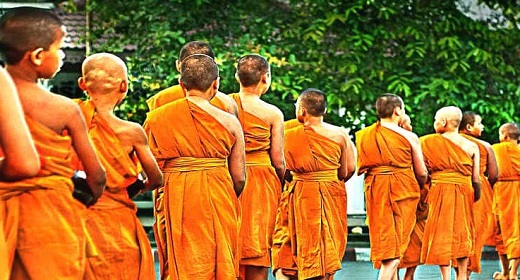by Swami Krishnananda: In our meditations, generally four kinds of thought operate…

Firstly, there is the thought: I am meditating. Secondly, there is the thought: I am meditating on something. Thirdly, there is the thought: There is an operation of the mind called meditation. There is a fourth thought of the attempt to exclude what one does not want to think at that time. This fourfold operation of thought characterises the initial stages of meditation.
In the art of meditation, the first attempt on the part of the seeker would be to diminish the number of these thoughts by eliminating the outermost first, and gradually bringing the mind inward to its own centre. The outermost thought would be the thought that certain things have to be eliminated from the purview of thinking: “I should not think certain things during my meditation.” Now, what are these things which we would not like to think in meditation?
Mostly, this is a vague idea in the mind, and we cannot easily make a list of all the things that we would like to avoid in our meditations. Or, briefly, we may say that they are all those thoughts which do not correspond to the nature of the object of meditation. Inasmuch as making a list or computerising these thoughts to be eliminated is not easy in a purely objective fashion, we may take to another recourse of seeing what thoughts we would like to entertain in regard to the object of meditation. And are there other thoughts intruding into our mind which do not essentially pertain to the nature of the object of meditation?
Here also you will find a little difficulty. In the same way as listing unwanted thoughts is not easy, the listing of positive thoughts in harmony with the nature of the object of meditation also would be a little difficult, because what are the thoughts that arise in your mind when you contemplate your great ideal, the object?
Firstly, that object of your meditation is the dearest, the most beloved, and there would not be anything in the world comparable to that object; and if there are things in the world with which you can compare other things as higher or lower, that is a thought that has to be eliminated. The thought of the object of meditation is incomparable, and any other thought that is subject to such comparisons is to be abandoned.
Now, why is the object of meditation incomparable? It is because you have somehow or other convinced yourself that this object is divine in its nature. Not only is it inclusive of all your aspirations, but the fulfilment of your longings can be seen in that concentrated point which you call the object of meditation. This is why we call it Ishta-devata – my beloved object, my deity.
You must understand what you mean by saying ‘beloved’, ‘dearest’. There are many beloved things in the world which you like very much. But the beloved is not simply what you like because there are many desirable things in the world, but they are not to be considered as beloved. The beloved is incomparable, only one, and it cannot be more than one; otherwise, this devotion to the object would be what is called vyabhicharini bhakti. Vyabhicharini means deviating from the centre or the promise given. It is divided devotion. Divided devotion is not reliable devotion. It will be finally a kind of hypocrisy that is engaged in by the mind. All your longings are to be seen fulfilled in that Ishta-devata.
What are your longings? Your longings are the multi-nature of your desires. Let them be multi, but they will be seen here. Do you not see all the rivers in the ocean? If you take a bath in the sea, you are veritably taking a bath in all the rivers of the world. In a similar manner, you may convince yourself that an object of your meditation is a symbol of inclusiveness, while all other things in the world are exclusive in their nature.
All objects in the world exclude one from the other. One is different from the other. The object of meditation is not different from anything, because all the things that you may think of as existing anywhere in creation are to be found in that concentrated spot. It is a miniature inclusiveness of cosmic existence. It is not only inclusiveness, it is capable of responding to your call. It is intelligent, all-knowing; it is a veritable incarnation of God Almighty. The conviction that all things can be found in this object of meditation is pre-eminently important. If the mind oscillates and feels that there are other things also which have some kind of value, that will be the source of your distraction. All the values of the world have to be considered as not only subservient to this supreme value that you recognise in the object of meditation, but the values of the world are actually no values. They are not merely lesser values; they are a negation of value, really speaking.
The relativity that characterises things makes them void in their substantiality. Nothing exists in this world by itself. An independent existence of anything is actually inconceivable. There is a relatedness of things in their character; everything hangs on something else for its subsistence. You cannot cognise or perceive anything in the world without distinguishing it from something else. If there is not something other than what you are seeing, that object that is seen will not be cognised. Also, the qualities that you see in objects are perceived by differentiation, division, and elimination.
Therefore, independently, substantially, nothing can be regarded as self-existent. The relativity of things completely destroys their assumed self-existence. This is to say that nothing really exists in this world by itself. If that is the case, you cannot expect anything from anything. How can you expect any value to come to you from things which do not exist by themselves, which are hanging on something else? You cannot beg for things from a beggar; he must be capable of giving you something. But things in the world cannot offer you anything because they themselves are existing by certain things offered to them by other things in the world. This is the meaning of the relativity of objects.
By such analysis, we may try to get over all thoughts in the mind which intrude into our process of meditation, and again assert in our meditations that the ideal on which we are contemplating is a self-existing reality. It is not a related object. It is not related because it is inclusive of all things. The objects in the world are exclusive of other things; the chosen object, the Ishta-devata, is inclusive of all things. This is the difference between the other things in the world, persons and things, and that which you have chosen as your Ishta-devata.
Hence, the objects, persons, things, ideas, etc., which are to be eliminated from the process of direct contemplation are easily understood. They need not harass you any more. They will not give you what you want because they have no substantiality in them, and they are relative in their character; and more than all that, even supposing that there are some values in the world, they are to be found in that which you are asking for in your meditation.
This is the first step that we may take in our sessions. Eliminate distracting, extraneous, unrelated ideas by a philosophical and value-based judgment of things. When this is achieved after a long period of many sessions of meditation and thought of the ideal, you will have only three thoughts left: the idea of the object, the idea of yourself being there as a contemplating individual, and the notion that something is going on – namely, meditation is going on.
If the object is dearest, you are also not to be considered as equal to it, because if you are also dear to yourself, the object cannot be called dearest. To what extent are you dear to your own self? That extent will diminish your love for the object of meditation. Two things cannot be best; no two things can be utterly beloved. Here is a conflict between yourself and the object of meditation. In the earlier stages, it was a conflict between external thoughts and the thought of meditation. Now it is something that boils down to the difference between yourself and what you have chosen as the best. Is it really the best Ishta? Do you love it entirely?
If you love it entirely and it is your God, the entirety of the love that is evinced in regard to the object of meditation abolishes all love not only of things outside, but even of your own self as an independent existence. The meditator loses the sense of love for himself; but more than that, at the same time, his very existence seems to be melting, gradually.
A thing that you do not like practically does not exist for you. And the thing that is not your beloved is not in your mind; it is out of your mind. This will be the case in regard to your own self also. I love my object, my deity, my ideal, my God so much that there is no love left after I have poured all my love upon that. There is not even a modicum left that I may centre it in regard to my own self. I have poured all my love on my ideal, so where is the love left for myself?
Then there is a gradual withering of personality. The constituents of individuality gradually get dismembered, as it were. The parts of the body dissolve and lose their constituency and substantiality. Why does this happen? It is because concentration has moved from the self of the individual meditator to the object of meditation. “Am I not important? Am I so negligible?” may be a question that one may raise to one’s own self. “Am I always to love others, and I am nobody?” This question should not arise because that which you are contemplating upon is not other than you. It is not somebody, it is everybody; it is all things. It is not something among many things; it is not somebody among many other bodies. And as you are also somebody, that somebody has to go, before that all-inclusive perfection.
It does not mean that you are not important, but your importance is enhanced by your identification with the importance that you recognise in your supreme object: I find myself in that which I love most. That kind of love is the supreme form of love of God. God-love is not object-love. It is not love of somebody or something. God is neither somebody, nor is He something.
It is not something that exists somewhere, nor is it calculable in terms of the difference between itself and others. It is all things, all values – which is to say, you also are included in all the values that are to be found in it. The meditator loses self-consciousness on account of the intense concentration on that object. But as long as you have some regard for your own self, intense love for the maintenance of this body and individual personality, somehow there is a fear that you are losing something that is worthwhile. Who would like to drown oneself? Even in the sea of God, drowning is horrible.
So there is a desire suddenly coming as an impediment even here in the recognition of the most beloved form of the concept of God. Self-love is the greatest impediment. Nothing can be as harmful as that because self-love is ego-love. You are not loving the Universal Self, but your personality self: this body, this mind, this related something. But in a well-conceived and analysed form of contemplation carried on with the deepest conviction of its supreme value, you will see yourself in that. You will not be losing yourself, as you fear, but you will be recognising yourself as a larger value than the value that you are now wrongly associating with yourself.
The original of every individual is in the heavens. We are shadows of our own personality, as philosophers tell us. Even these persons seated here are not real persons. They are shadows of the originality of everyone. The originality is in the heavens. That is the reason why, many a time, you feel very miserable about yourself. It is not true that you are really loving yourself. Sometimes you get fed up with your own self also: “This wretched personality, let it go!” Why should you feel like that if it is the most beloved? Only when it is pampered does it look beloved. Otherwise, it gives you pricks now and then, taunts you, and tells you what it really is: “I am a shadow, my dear boy. You are not here. You are in the highest heavens.”
Every human individual actually extends to all the levels of creation. All the lokas mentioned in the Puranas and the epics are to be found in a miniature form in our own selves. The chakras of hatha yogis or kundalini yogis are only miniatures in our own personality of the cosmic existences of the worlds, realms, or lokas. Therefore, we are veritably cosmic in our nature.
Thus, in our meditations, we are in a position to feel ourselves as present in the object of meditation. Actually, we should not call it an object. It is no more an object to us; it is a higher form of our own self. If a larger dimension of our self can be regarded as an object to our lower self, then we may also call God an object. The superior is higher than the inferior, but the superior is not necessarily outside the inferior. It is only a calculation of value, and not a real objective perception. So the God-oriented thought is the thought of the higher Self of your own personality. Your own higher Self is being contemplated by the lower self. Therefore, because of the fact of the higher including the lower, it does not become difficult for you to merge your lower in the higher, because the higher includes the lower.
Then, what happens? You see only that which you have been contemplating upon. We do not know at that time whether we are thinking the object, or the object is thinking us – whether it is a contemplation of someone on something, or something is contemplating on someone. As the analogy goes, when there are two tanks filled with water up to the brim and they are on a common level, when water flows from one tank to another tank, you do not know which water flows to which tank.
The externality of things prevents the mutual collaboration of values between oneself and the other. The object, so-called, has to be on a par with our own selves, and we have to be on a par with that object. If I am superior to the object or the object is superior to me, there will not be a correspondence between me and the object. There should be such a similarity of nature between me and that object I am contemplating upon that it is possible for us to melt into each other. If there is the slightest difference between one and the other, they will not merge. They will stand separate.
This union of conscious Being – the subjective consciousness, with the very same consciousness existing as the so-called object outside – is called samadhi in the terminology of Yoga. Samadhi means equilibration of consciousness. In our perceptions of the world, such equilibration does not take place. The balance tilts either on the objective side or on the subjective side, in most of our perceptions.
Either we love our own selves too much in contrast with the other things, or we love other things too much in contrast with our own selves. A balance is very rarely seen between ourselves and the world outside. It is not easy to strike that balance, but as the world is a complete inclusiveness, this balance has to be struck in order that we may contact Reality, so to say. Reality is not exclusive of anything, as we have mentioned already; it is inclusive of all things, including your own self. This consciousness of unity is samadhi; sometimes it is also called samapatti.
The gradations of this union also are to be considered so that we may know what is actually ahead of us. We cannot always know what is laid for us in our future. In the earliest of stages, everything seems to be clear. We have come to a holy place, an ashram and a meditation hall; we are in the proper mood of contemplation, and everything is fine. But it will not be fine always, because the suffering that the mind would feel when it is presented with some context or situation with which it cannot accommodate itself will cause it some kind of restlessness and agony. We will not know what is happening. The mind will say, “What are you doing to me? I was getting on well with things and persons, and all things in the world look beautiful. Now, what are you up to? What is the matter? Why are you sitting here and thinking something which is not my way?” But if we do not listen to this call and persist in our concentration, it will tell us, “I cannot accommodate myself to this body any more. I shall bid goodbye to you.”
When it starts thinking in this manner, the pranas will get agitated. There is a connection between the mind and the prana. At that time it is that we feel tremors in the body; we will feel a kind of jerk in the whole physical personality in meditation. It is the non-accommodating response from the mind, communicated through the pranas to the body, that is responsible for this agitation, and we should not be carried away by this difficulty. It is a passing mood.
In the earliest of stages, children refuse to eat. A little baby will not take even milk. It will cry and kick. Even if we give sweets, it will throw them down. It will simply yell; it wants to eat nothing. How is it? It is not accustomed to eat anything because it is just born. It has to be habituated to eating, drinking, etc., and to social values. Gradually, it learns how to suck the mother’s breast, to drink milk, to eat sweets, and lick its own thumb, and all sorts of things. In a similar manner is the difficulty with the mind. In the beginning, it will reject everything. We will have aches and pains, joint pains, backache, neck pain, fever, and agitation. “I am not for it. I’ll go,” the mind will say.
Whenever you pursue something which is not the usual habit of the lower nature of the mind, these kinds of difficulties will certainly arise. But, abhyāsa vairāgyābhyāṁ tan nirodhaḥ (Yoga Sutras 1.12): these agitations of the mind, these vrittis as they are called, should be somehow or the other subdued by persistence – intense persistence, which cannot be possible unless you actually love that which you are asking for. If your love is half-hearted, if there is a doubt about God’s benedictions upon you, if you do not know what is going to happen in your realisation of God, then the intensity will come down. If you are not sure that you are going to succeed, how will you wage a battle? If in the beginning you have diffidence – “I don’t know whether I will win or not” – this kind of war is no war. You have to go with the confidence that you are going to win. Then the strength also emerges.
Unknown forces will enter into you by the confidence that you entertain in yourself. “I shall stand first in the exam, not second or third. Why should I not? I have studied well. Everything is clear to my mind. I have no doubt.” And so also is the conviction that is required here. “Everything is very clear to me. I have chosen the right path. The object has been correctly chosen, and there is nothing wrong with me. I have adapted myself correctly to the nature of meditation. I shall succeed. I shall break this entanglement of personality consciousness. I hope to achieve God in this birth itself. Why should I take many births? What is wrong with me that I should take hundreds of births?” Analyse yourself: Is something wrong with me?
Go on making a list of your wrongs, if you have got any, and brush them aside by the conviction that there is no point in doing anything devious in this world, because of the fact that the world is not going to give you anything, not even a farthing. Such convictions will give you confidence, and it will not be merely a theoretical assertion that you shall attain it today, in this birth. It may be really possible. Yogis tell us that many births can be compressed into a single birth if the concentration is very intense. After all, births are not really physical; they are psychological. It is the mind that takes birth, so the bodily existence is not a real impediment to us. It is the mental existence that is the trouble-giver. If all the potentialities in the mind which are causes of future births can be compressed into a process of intense concentration, many births can be passed through in one birth.
If there are hundreds of rose petals kept one over the other, and we pass a needle through them, in an instant the needle will pass through all the petals. It will look as if it has taken no time at all, but actually it has taken time to pass through every petal, one after the other. It is not an instantaneous action that has taken place, but the nature of the action was such that it appeared so. Similarly, we will pass through many births instantaneously, though actually we are passing through all the stages of all the births. All the joys and sorrows of all the future births also we can pass through in this birth itself. We need not have to enter into the mother’s womb once again; that is not essential. We can mentally enter into the mother’s womb and suffer all the agonies of future births, which is possible only if our concentration is very intense. When the potentials of future births get melted down and in one birth itself, God can be realised.
The degrees of samadhi that I mentioned are actually correspondent with the degrees of the manifestation of the cosmos, which also can be traversed quickly if the concentration is very intense. There is the physical world of perception; there is the subtle world of the tanmatras – sabda, sparsa, rupa, rasa, gandha, as they are called; there is the mental world of cosmic existence; there is the intellectual world; there is the causal world; and there is the final Absolute, Brahman.
The degrees to which I made reference in our concept of God also apply to us in our process of meditation. Everyone has to pass through all these degrees. In the Upanishads and the Bhagavadgita, sometimes we are told that various stages have to be passed through until we reach God, especially when, as the scriptures tell us, we pass through the stages during the northern course of the sun – the uttaramarga, as it is called. And finally, after fourteen or fifteen stages of ascent, we reach Brahmaloka and the Supreme Brahman. This is what is told us in the Gita as well as in the Upanishads. But these stages can also be considered as purely psychological, and not necessarily take immense time in the natural process. It can be actually a traversing of the soul in the process of time. That can be, as it is possible for us to take many births in order that we may get educated in the art of love of God. But that is not always essential.
Your feeling is your master. What you feel about yourself, that you really are. If you feel, “I am a humble nobody, a nothing; even before God I am a sinner,” then you have already characterised yourself and described yourself as something useless. How would you become other than that? Why should you have such a wrongly conceived definition of yourself? What sin have you committed? You might have made some mistake due to ignorance, and now you are awakened. The errors that you commit in the dream state do not pursue you in the waking condition. Otherwise, money that is borrowed in the dream world may have to be paid in the waking world. That is not necessary, because consciousness itself has changed its level.
All that you have done, all you have gained and lost in the dream world does not affect you in the waking world. All the empires that have vanished in the dream world do not harass you in the waking world. The death of your relatives in the dream world does not affect you in the waking world. So is the case with all the things that you did in this world; they will vanish in one second.
You are really not so bad. There is some goodness in you – especially these blessed souls who are seated here come from long distance – devotees, disciples, followers of Gurudev Swami Sivanandaji Maharaj who have spent a lot of money in travelling, undergone sufferings in heavy rains, and have all sorts of inconveniences even in this ashram during these days. You are really blessed people; otherwise, you would have run away from here in two days. That you have continued to exist here and feel something worthwhile here shows that there is some element of divinity persisting in you and that God is not always unkind to you. So be sure: “I am a blessed person.”
I always remember Gurudev Swami Sivanandaji’s saying, “No one can keep his foot on the platform of Rishikesh Railway Station unless he has done many meritorious deeds in the previous birth. He will go away from Haridwar itself. He will not come this side.” You cannot step on the platform of the Rishikesh railway station unless you have done some good deeds. It is a holy platform. Even the railway station is a very holy place, what to talk of Rishikesh, Mother Ganga’s bank, and the ashram of Sivananda in Muni-ki-Reti, the sands which were trodden by great Masters, sages such as Vyasa, Vasishtha and others. Are you not blessed? Why do you complain? Be happy. Not only be happy that you are blessed in the ordinary sense of the term, but you are going to achieve what you want to achieve in this birth itself. Do not say, “I don’t know whether it is possible for me or not.” If you define yourself in such a foolish way, you will get exactly what you are defining yourself as. Always be positive, confident, and convince yourself that you are fit enough to place yourself before the altar of God. If you are fit to be disciples of Swami Sivanandaji Maharaj, you are also fit to be devotees of God.
So let there be a strenuous effort on your part every day to condition your mind in such a way that all your activities in this world, your performances, your duties in any walk of life, have a background of this fundamental thought of God-realisation. “Why am I going to a factory every day? Why do I work in the office? Why do I drudge on in a college or a school? Why do I pull a rickshaw? What is the matter with me? Why do I sell vegetables? Why do I have a business? It is because I want to realise God in this birth; otherwise, why should I have a business or do anything whatsoever?” You are not doing business for money’s sake, but because you want to exhaust your prarabdha and wear out all the karmas of the past, and make yourself fit to stand before God, the Justice of the cosmos.
Therefore, there is nothing wrong with your duties in this world. Go on doing your work as before, whatever be your performance in any walk of life, because it is karma yoga. It is an action that is yoga by itself. It becomes yoga because it is a necessary step in the direction of God-realisation. Work is not a bondage; action cannot bind, na karma lipyate nare (Isa 2), if it is done as yajna – performance of a duty towards God. All your actions are worship of God. Work is worship; that is what is always said. How can work become worship unless it is actually dedicated to God? And if God is all-pervading, immanent in His nature, all that you do anywhere is seen by Him, and it is certainly to be offered to Him.
The world is not always a bondage. It is converted into a bondage by your wrong notion of it. Vairagya, renunciation, sannyasa, all these terms imply the renunciation of erroneous ideas that we have about the world and people. Sannyasa is not rejecting the world and people; it is rejecting the notion that you have got which is incommensurate with the true nature of people, things, and the world outside. Mentally you can adjust yourself in this fashion and be a true devotee of God Almighty. May His divine grace be upon you all. May you realise Him in this very birth.









































